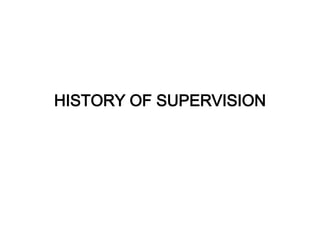
Evolution of Instructional Supervision
- 2. History of Supervision • In colonial New England, supervision of instruction began as a process of external inspection: one or more local citizens were appointed to inspect both what the teachers were teaching and what the students were learning. • The inspection theme was to remain firmly embedded in the practice of supervision.
- 3. History of Supervision • The history of supervision as a formal activity exercised by educational administrators within a system of schools did not begin until the formation of the common school in the late 1830s • During the first half of the nineteenth century, population growth in the major cities of the United States necessitated the formation of city school systems
- 4. History of supervision • . While superintendents initially inspected schools to see that teachers were following the prescribed curriculum and that students were able to recite their lessons, the multiplication of schools soon made this an impossible task for superintendents and the job was delegated to the school principal. • In the early decades of the twentieth century, the movement toward scientific management in both industrial and public administration had an influence on schools.
- 5. History of Supervision • . At much the same time, child-centered and experienced-based curriculum theories of European educators such as Friedrich Froebel, Johann Pestalozzi, and Johann Herbart, as well as the prominent American philosopher John Dewey, were also affecting the schools.
- 6. History of supervison • Thus, school supervisors often found themselves caught between the demand to evaluate teachers scientifically and the simultaneous need to transform teaching from a mechanistic repetition of teaching protocols to a diverse repertory of instructional responses to students' natural curiosity and diverse levels of readiness.
- 7. History of supervision • . This tension between supervision as a uniform, scientific approach to teaching and supervision as a flexible, dialogic process between teacher and supervisor involving the shared, professional discretion of both was to continue throughout the century.
- 8. History of supervision • In the second half of the century the field of supervision became closely identified with various forms of clinical supervision. • . Initially developed by Harvard professors Morris Cogan and Robert Anderson and their graduate students, many of whom subsequently became professors of supervision in other universities, clinical supervision blended elements of "objective" and "scientific" classroom observation with aspects of collegial coaching, rational planning, and a flexible, inquiry-based concern with student learning.
- 9. History of supervision • In 1969 Robert Goldhammer proposed the following five-stage process in clinical supervision: (1) a pre-observation conference between supervisor and teacher concerning elements of the lesson to be observed; (2) classroom observation; (3) a supervisor's analysis of notes from the observation, and planning for the post-observation conference;(4) a post-observation conference between supervisor and teacher; and (5) a supervisor's analysis of the post-observation conference
- 10. History of supervision • For many practitioners, these stages were reduced to three: the pre-observation conference, the observation, and the post-observation conference. • Cogan insisted on a collegial relationship focused on the teacher's interest in improving student learning, and on a nonjudgmental observation and inquiry process.
- 11. History of supervision • The initial practice of clinical supervision, however, soon had to accommodate perspectives coming out of the post-Sputnik curriculum reforms of the 1960s that focused on the structures of the academic disciplines. • Shortly thereafter, perspectives generated by research on effective schools and effective classrooms that purported to have discovered the basic steps to effective teaching colonized the clinical supervision process.
- 12. History of supervision • It was during this period that noted educator Madeline Hunter adapted research findings from the psychology of learning and introduced what was also to become a very popular, quasi- scientific approach to effective teaching in the 1970s and 1980s. • These various understandings of curriculum and teaching were frequently superimposed on the three-to five-stage process of clinical supervision and became normative for supervisors' work with teachers.
- 13. History of supervision • Nevertheless, in many academic circles the original dialogic and reflective process of Cogan and Goldhammer continued as the preferred process of supervision. • This original process of supervision has been subsequently embraced by advocates of peer supervision and collegial- teacher leadership through action research in classrooms. Despite the obvious appeal of clinical supervision in its various forms, it is time-consuming and labor-intensive, rendering it impossible to use on any regular basis given the large number of teachers that supervisors are expected to supervise (in addition to their other administrative responsibilities).
- 14. History of supervision • Recognizing the time restraints of practicing supervisors, and wanting to honor the need to promote the growth of teachers, Thomas Sergiovanni and Robert Starratt suggested, in 1998, the creation of a supervisory system with multiple processes of supervision, including summative evaluation.
- 15. History of supervision • Such a system would not require the direct involvement of a formal supervisor for every teacher every year. • The supervisory system might cycle teachers with professional status through a three-to five-year period, during which they would receive a formal evaluation once and a variety of other evaluative processes during the other years (e.g., self- evaluation, peer supervision, curriculum development, action research on new teaching strategies, involvement in a school renewal project).
- 16. History of supervision • The once-a-cycle formal evaluation would require evidence of professional growth. Sergiovanni and Starratt also attempted to open the work of supervision to intentional involvement with the school wide renewal agenda, thus placing all stimuli toward professional growth–including the supervisory system–within that larger context.